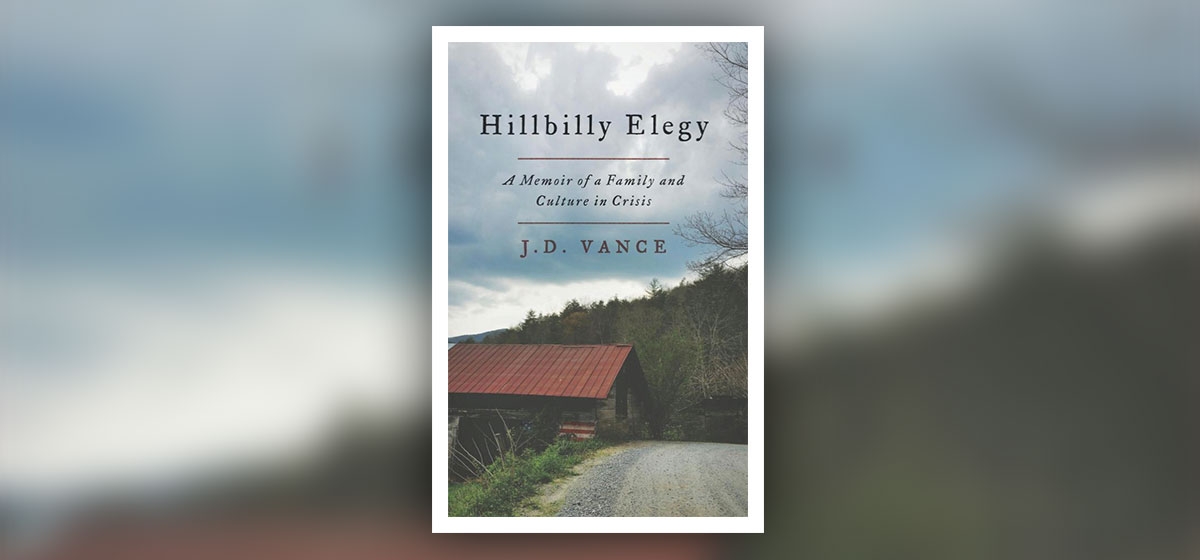The Weird Parallels Between the Hillbilly Elegy Author and Me

I just completed a series of posts on Thomas Piketty’s “Capital in the Twenty-First Century,” a book that experienced an astonishing publications history—despite being 700 pages long and a hard slog—because it caught the exact tenor of the times. A very different and more accessible book that enjoyed similar popularity, and for the same reason, is J. D. Vance’s “Hillbilly Elegy.”
”Hillbilly Elegy” appeared in mid-2016 and immediately established itself not only as a bestseller, but as a bestseller with very long legs. It was praised by both liberals (New York Times, Slate, Brookings Institution) and conservatives (Wall Street Journal, National Review). The Economist said, “You will not read a more important book about America.”
Despite this praise, and although I had read Piketty’s book as soon as it came out, I skipped Vance’s book on the sensible grounds that, having lived that life, I didn’t need to be reminded of it. But over time I received literally dozens of messages from people insisting that I read it because it was “terrific” and “full of amazing parallels” with my own life.
So I read it and people were right on both counts: the book was terrific, and at least in its broad outlines J. D. Vance’s life certainly paralleled my own. To wit:
- Vance’s grandparents (“Mamaw” and “Papaw”) were born and grew up in the small southeastern Kentucky town of Jackson, population about 6,000. My grandparents were born and grew up in the small southeastern Kentucky towns of Barbourville (population about 3,000) and Manchester (1,400), near Harlan. Barbourville is 90 miles south of Jackson, in those days a roughly three-hour drive.
- Vance’s Papaw was related to the infamous Hatfield clan, former Confederate soldiers and sympathizers who carried on a murderous, multi-generational feud with the Union-sympathizing McCoy family. My grandfather was friendly with the McCoys, and whenever he left Barbourville, usually on horseback, he always carried his six-gun, just in case.
- Vance’s Mamaw and Papaw left southeastern Kentucky and moved north to Ohio. My grandparents left southeastern Kentucky and moved north to Ohio.
- Vance’s Mamaw and Papaw settled in the mid-sized city of Middletown (pop. 50,000), 25 miles from Dayton. My grandparents settled in the mid-sized city of Springfield (pop. 70,000), 30 miles from Dayton.
- Vance had a checkered K-through-12 career, got himself straightened out in college, and eventually graduated from Yale Law School. I had a checkered K-through-12 career, got myself straightened out in college, and eventually graduated from Harvard Law School.
- Vance settled with his family in a large Midwestern city, Columbus, Ohio. I settled with my family in a large quasi-Midwestern city, Pittsburgh, Pennsylvania. Bizarrely, like Barbourville and Jackson, Pittsburgh and Columbus are about three hours apart.
As if all that weren’t enough to start sending chills up my spine, I came across this (slightly edited) passage in Vance’s book:
On the way back [to North Carolina], on a narrow mountain road in Virginia, I hit a wet patch of road coming around a turn, and the car began spinning out of control. I was moving fast, and my twisting car showed no signs of slowing as it hurtled toward the guardrail. I thought briefly that this was it—that I’d topple over that guardrail and join Mamaw just a bit sooner than I’d expected—when all of a sudden the car stopped. *** I reoriented the car, returned to my lane, and pulled off to the side.
Roughly a year before I read Vance’s book I had sent the following note to one of my partners, who had asked how I’d fared getting back to Pittsburgh from Philadelphia on the Pennsylvania Turnpike in a major thunderstorm (this is also slightly edited):
It rained hard the whole way, but especially in the Allegheny Mountains. I was in the passing lane and had just overtaken two semis when my car hit a spot in the road where water had pooled up, creating a small lake. Unfortunately, it was an invisible lake and when I hit it, it was like hitting a brick wall. My car went airborne and then skidded sideways across the surface of the water into the right lane. I braced for the collision with the semis, but it didn’t happen. However, I was now careening sideways toward the berm with the guard rail coming at me fast. I could see in my mind’s eye my car slamming into the guard rail, flipping over it and tumbling down the embankment on the other side. This, I thought, is where I will die. But suddenly my car stopped. I sat blinking through the windshield, not understanding what had happened. But then I realized that I must have hit the guard rail and bounced off it. I got out in the pouring rain to assess the damage, but when I looked at the side of my car there wasn’t a scratch on it—miraculously, I had stopped eight inches from the guard rail.
Well, okay, folks, things are starting to get weird…
But, actually, not that weird. The separated-at-birth theme of this post is actually misleading, because we have so far focused only on the parallels between Vance’s life and mine. Next week we’ll put matters in perspective by taking a look at some of the dramatic differences.
Next up: On Hillbilly Elegy





